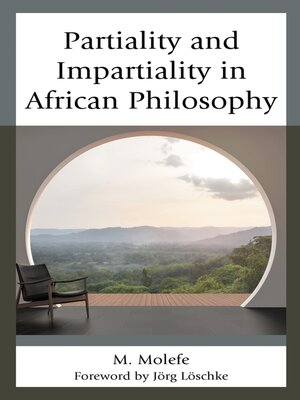Partiality and Impartiality in African Philosophy
ebook ∣ African Philosophy: Critical Perspectives and Global Dialogue
By M. Molefe

Sign up to save your library
With an OverDrive account, you can save your favorite libraries for at-a-glance information about availability. Find out more about OverDrive accounts.
Find this title in Libby, the library reading app by OverDrive.



Search for a digital library with this title
Title found at these libraries:
| Library Name | Distance |
|---|---|
| Loading... |
Partiality and Impartiality in African Philosophy fills the lacuna in African philosophy literature on the inherent tension between requirements of partiality (favoritism) and impartiality (equality). Motsamai Molefe deploys two strategies to philosophically resolve the tension between partiality and impartiality. The first strategy involves applying the moral theories of Kwasi Wiredu, Thaddeus Metz, and Kwame Gyekye to the problem. Finding their views useful in some ways and seriously limited in others, Molefe turns to the second strategy in which he invokes the salient normative concept of personhood in African cultures. Molefe argues that the concept of personhood adjoins theories of human dignity and moral perfection (virtue). The major insight that emerges is a robust ethical theory qua personhood that accommodates both partiality and impartiality. He grounds requirements of impartiality on human dignity, which operates largely as a macro-ethical concept that normatively informs the character of our social institutions (politics). Politics is characterized by fairness, equality, and impartiality. Partiality (the agent-and-other-centred forms of it) is directly connected with the agent's chief moral duty to achieve her own virtue (moral perfection), which operates as a micro-ethical concept. These two kinds of moral partialism, self-favoritism and close ties such as family, are justified by appeal to the project's view, instead of the individuals-and-relationships view typically invoked to justify moral partiality in the literature.







